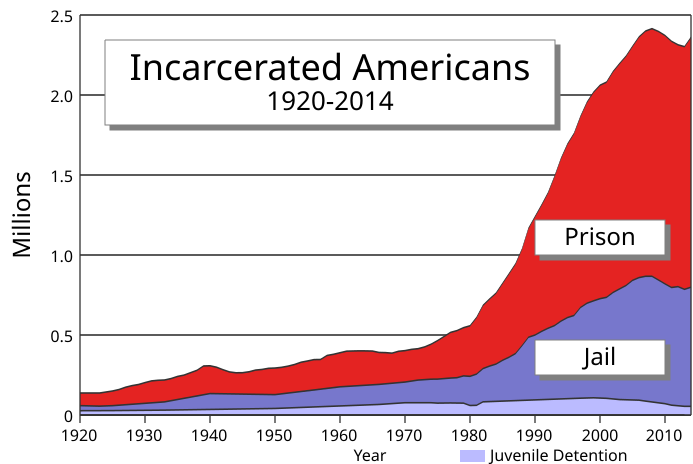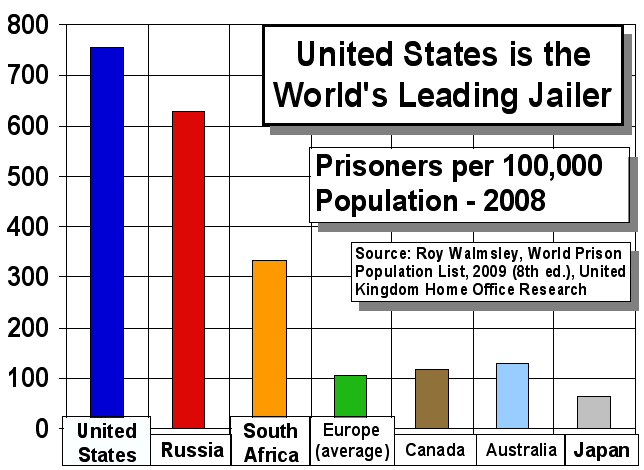A peace treaty to end the drug wars? Or, why we have five times the incarceration rate of the average for the world
by John MacBeath Watkins
The debate about legalizing marijuana in the state of Washington is heating up. From the Seattle Times (full story here.):
A coalition that includes former U.S. Attorney John McKay, Seattle City Attorney Pete Holmes and travel guide Rick Steves is launching an initiative that would legalize marijuana in Washington state.
Let's join the debate. To begin, let's compare a couple of charts, shall we?
(chart from Wikipedia)
It's easy to see why bookstores are having a hard time. Not only were those charts easy to find, the other stuff you can get quickly is amazing. I've just watched one of my favorite films, and one of my favorite lines in it is "Cousin, you're back at last! But what a state! Quick! A shirt and a sandwich! Melons and a hat! Stockings!"
As an experiment, I plugged the line (which was the original title of this post) into a search engine, and lo and behold, up comes the entire screenplay of The King of Hearts. Before the internet I'd have had to search a fairly large library to find the screenplay, and I might have found it untranslated, in the original three languages. I suppose that has something to do with the spellchecks that insist I've not written internet right unless I capitalize it, as if it was a proper name, or I was writing about God. It's as if you'd be taking technology's name in vain.
But why is that such a good line? The film is about the insanity of war, as revealed by the reaction of the inmates of an insane asylum to it. That line has a hallucinogenic absurdity to it that takes us to a metaphorical war, the war on drugs, which increasing numbers of people are saying is over, and the drugs won. Is it time, then, to negotiate a peace treaty?
One consequence of the drug war is that we have 25% of the world's prison population, with only 5% of the world's total population, which if my math is right means we have five times the average incarceration rate for the world (and five times the incarceration rate we had prior to 1980.)
This is tremendously expensive. And it has a great deal to do with our drug laws and their enforcement.
It seems to have escaped the notice of most Americans that the easiest and cheapest way to cut the crime rate is to make more things legal. The political solution is perhaps slightly more rational than calling for melons and a hat: Hire more police and lock more people up for longer periods of time. This might be an efficient way of dealing with the problem if our prisons were really good at getting people to stop committing crimes.
But in fact, it seems that the people who have the easiest time getting out of a life of crime are those who don't get caught, don't get a prison record that keeps them from getting a good job, don't learn what our prisons have to teach. They are the ones more likely to pay taxes than to be a burden on the taxpayer. The Stanford Prison Experiment showed back in 1971 how prisons only bring out the worst in people, regardless of which side of the bars they are on. We've responded to this knowledge by putting more and more people behind bars. Quick! A shirt and a sandwich!
We now have guards' unions lobbying for longer prison sentences because that's how they get job security. We have private prison companies that benefit from these policies as well. We have police corrupted by drug money in a most peculiar way -- property forfeiture laws have made arrests so lucrative for police department budgets that in some cases, such as the notorious Tenaha, Texas, scandal, police have been allegedly using the laws to take property from innocent people. The corrupting temptation this puts before police agencies is illustrated by this chart (from here.)
Of course, there will always be corrupt police. And biased judges, bad restaurants, etc. The problem is that the drug war puts so much power in their hands and so much wealth within reach. Tenaha might have been known for a speed trap in a more innocent age, but the drug war has increased their power, and in economic terms, the rent they can gain by abusing it. Nor is this the only corrupting influence of the drug war on police -- because distribution of drugs is illegal, there are drug dealers out there who can't go to the authorities if money is stolen from them -- sometimes by the police.
With budgets straining, perhaps we can take another look at the money we're spending on this and come up with a more sensible arrangement. Take another look at the charts above. The crime rate started to decline when the baby boomers passed peach age for criminal activity, spiked again as crack flowed into neighborhoods and gangs fought violent turf wars, and has been declining since. If the crime rate were falling because incarceration was increasing, we would expect to seen a steady decline as the incarceration rate increased.
Now, we'd like to think the incarceration rate has something to do with the decline, and in fact, I'm pretty sure it does have something to do with it. Notice that the American violent crime rate started to decline in 1980, when incarceration increased. Here, by way of contrast, is the history of the crime rate in the United Kingdom, from a BBC story (the green line, which tracks serious crime, is most comparable to the chart shown for American murder and robbery rates.)
Note that when we began our incarceration spree in 1980, our crime rate started dropping. Note also that the second peak in the early 1990s is a closer match to the UK crime rate.
Canada also saw its violent crime rate peak in the early 1990s, so some part of the drop in crime since then is not attributable to incarceration, but to demographics or other broad social trends. Part of the difference in the total crime rate and the violent crime rate in the chart above can be attributed to the fact that many people were arrested for non-violent drug offenses. Consider these two charts:
And, from here:
Notice that the arrests for teen drug crimes blossomed at a time when there was no corresponding increase in teen drug use. By this time, the war on drugs had a momentum of its own. Stepped-up enforcement was producing an increase in crime statistics and people charged with crimes while there was no corresponding increase in criminal behavior.
Not that drug dealing is anything but a criminal enterprise. That, in fact, is one of the major problems with the drug war. That spike in violent crime when crack came into the neighborhood? That's caused by the distribution of crack being illegal. If it were legal to sell the stuff, a bunch of thugs could not compete with Phillip Morris in the efficient advertising and distribution of the drug. We don't let Phillip Morris compete on these grounds because we recognize that crack really messes up the people who use it. Making crack legal would increase the number of users, just as ending Prohibition increased alcohol consumption.
The question is, does the harm done by the drug use outweigh the harm done by empowering criminal enterprises by making the drugs illegal? Organized crime was with us before Prohibition, but it gained wealth and stature when the distribution of alcohol became illegal, and businessmen unwilling to risk their freedom for profits abandoned the distribution of alcohol. When alcohol distribution became legal again, career criminals engaged in it had to find new careers, either different crimes or honest work.
We really need to study this question -- are the drug laws producing more harm than the drugs they control would if they were legal? I'd have a hard time justifying the damage methamphetamine can do based on this calculus. It seems to me that the issue is much easier with marijuana, because it seems to blight people's lives far less than alcohol, which we've decided produces lower social costs as a legal drug.
Not that I've come to expect rational results from our political process, but we need rational voices in the debate over drug policy or we'll never get there. At a time when Mexico is being torn apart by the criminal enterprises that deliver our marijuana and our prisoners are overflowing and costing us more than we can afford, it's good to see some former prosecutors adding their voices to a call for legalization.
The proposed initiative calls for regulation of marijuana sales much like the regulation of alcohol sales, which seems entirely rational to me. But what shall we call the legal purveyors of euphoric hemp? "Dope dealer" should apply only to illegal sales, just a "bootlegger" only applies to illegal purveyors of alcohol.
I propose we call them commercial thurifers, after the fellow who swings the thurible in the more formal sort of religious service, spreading aromatic smoke. For those who use marijuana for non-medicinal purposes, after all, it has become a social sacrament. As it happens, my social milieu is not one that uses this sacrament to solidify its bonds, but any anthropologist will tell you, most societies have some such use of substances. If this is a normal part of human society, we'll make little progress eliminating it entirely.
More on this topic here and here and here.






Comments
Post a Comment